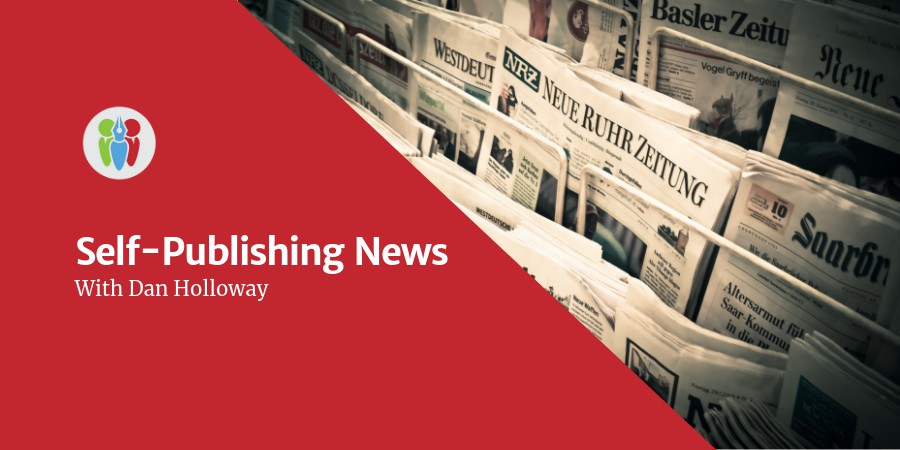
ALLi News Editor Dan Holloway
In this week's Self-Publishing News, ALLi News Editor Dan Holloway takes a look at revelations about how much information Amazon has on what you do with your Kindle.
One of the wonderful things about being a writer is that you can find yourself almost anywhere. In my other lives I find myself confined to specialisms, but as a writer I end up speaking at a whole panoply of events. Right now I am preparing for a schools science festival. Then I will be at a museum. We really do have so many doors open to us.
What Amazon Knows
It feels like I’ve gone a long time without reporting on Amazon. With the obvious exception of Audible, that is. They probably wish they hadn't been in the news this week. In the UK, the BBC ran a high profile documentary in its Panorama series about what information Amazon holds on each of us. If you have access to BBC iPlayer you can watch it there. Amazon's data stash on us falls roughly into three categories. The most obvious comes from the clicks we make on their site (and related cookies from around the internet after we've been there). Most of us sort of know that already. Then there's what Amazon's voice first tech, Alexa, picks up. In theory we know this goes on, though it still feels a bit weird.
Kindle is Watching You
But the really interesting category is the information Amazon gleans from our Kindles. The author of this article that accompanied the programme put in a subject access request to Amazon. He discovered they had information on more than 83,000 interactions he'd had with his Kindle in just 2 years. That's key-stroke and length of time on each line level detail. One reason I find this fascinating is the research I reported on last year by Lora Dietz. Dietz's research into public perception of artificial intelligence focuses on Amazon. And she found that what scares readers the most about amazon is not knowing your buying or your viewing history. Rather, it's what Amazon knows about what you do inside the covers of a book. At a time when we want more people to read, and when we as indies rely so much on Amazon's electronic platforms, this may concern us.
And on the subject of Audible Captions, it seems as though the very last chapter might be on its way soon. The judge in the case has dismissed requests to keep full financial settlement details private. We will shortly, that is, know at least some of what Amazon knows.
Rights
Maybe it's a sign of self-publishing's maturity that we are starting to see then and now stories. This week there was a particularly illuminating one from the always worth listening to Kristine Kathryn Rusch. She looks at the changing ways indies have made our money over the past decade. In the beginning, we handed over more control for less money. Now, we are increasingly retaining all our rights and selling them in multiple formats and territories, often at higher rates of return.
How We Read, and How We Sell
Several stories this week have looked at the format in which people read, and what that means for how we sell books.
A fascinating piece of research is getting underway from the Panorama Project (nothing to do with the TV programme in the first section). Their Immersive Reading project will look at the pressures that other media are putting on reading. Guy Gonzalez will be talking about the project at this month's Pubwest.
Meanwhile, a very detailed post looked at the “tale of two writing worlds” that still exists between indies and traditionally published writers. Indies are still, it claims, punching below their weight in print for a number of factors. Meanwhile, ebooks, the suggestion is, is almost the opposite. On a very related note, printers are still struggling to persuade publishers of the value of print on demand. Academic publishing, in part because of its small numbers, in part because of the convenience of being able to update constantly. But other areas lag behind, despite the increasing affordability, and serious environmental concerns over the industry's returns problem.
And finally, good news from Google Play. It is now easier than ever to publish with them direct. There is no longer a wait for an invitation code. It will be interesting to see if indies consider publishing direct there worth the time it takes for the small extra royalty on sales it generates.
What Amazon know about the way you use your Kindle and top #selfpub news stories for #indieauthors, in one quick read, by #ALLi News Editor Dan Holloway @agnieszkasshoes #digitaleconomy #publishingopenup Share on XOver to You
Would you activate Audible Captions on your audiobooks? Let us know in the comments below.
Upcoming Conferences and Events
FEBRUARY 2020
Pubwest, 20-22 Feb [Portland, Oregon]
MARCH 2020
London Book Fair, 10-12 Mar [London]
APRIL 2020
Self-publishing Conference, 25 Apr [University of Leicester] Short story course, 2 Apr – Sep (6 workshops) [London]
AUGUST 2020
Self-publishing Live, 14-16 Aug [Chicago]
SEPTEMBER 2020
DigitalBookWorld, 14-16 Sep [Nashville]




